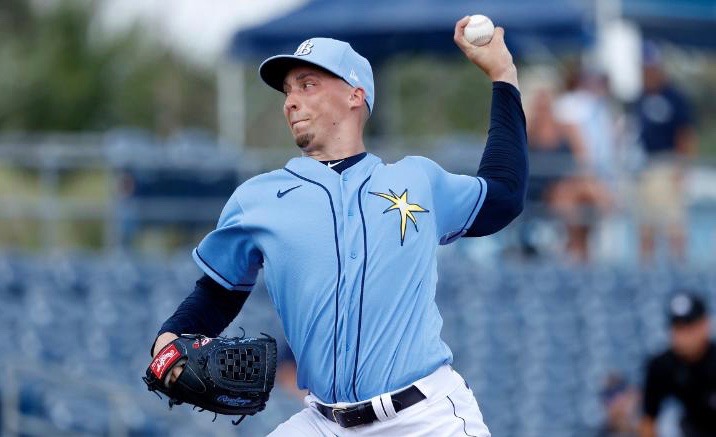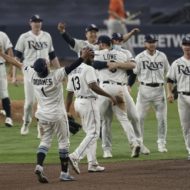
Major League Baseball (MLB) and the Major League Baseball Players Association (MLBPA) engaged on a possible restart to the COVID-19-paused 2020 season. In spite of the very public dispute surrounding economic issues leading up to Tuesday’s negotiations, both sides started by debating less contentious proposals.
According to Jesse Rogers (ESPN, link), the discussions revolved around roster and transaction rules, as well as the plan for a second Spring Training.
Both sides also discussed the proposed universal DH plan, which would see all teams adopt a designated hitter for the 2020 season. The players association is expected to approve of that portion of the league’s proposal.
While unpopular with baseball purists, universal DH is a reasonable arrangement since pitchers will be asked to prepare for a season unlike any they’ve played before, with a schedule that could go deeper into the year. The removal of banal tasks, like swinging bats and running the bases, could reduce some unnecessary wear and tear on a pitcher, thus allowing them to stay healthy longer.
Universal DH will serve other purposes too, such as allowing tired players to get rest without missing at-bats. That will come in handy if/when the 82-game schedule calls for playing six-to-seven games a week, including scheduled doubleheaders.
The matter of health and safety were debated as well. According to Ken Rosenthal (The Athletic; paid subscription), the league is preparing an 80-page presentation on measures and protocols for dealing with the coronavirus pandemic.
The league, which made a presentation Tuesday to the Major League Baseball Players Association on how to restart the season, soon plans to present the union with an 80-page document outlining potential health and safety protocols for the COVID-19 pandemic, sources said.
— Ken Rosenthal
Rosenthal notes that the document will cover a wide range of topics, including testing, procedures for the possibility a player or staff member becomes ill and guidelines for clubhouses, hotels, and transportation. The protocols will be subject to union input and approval.
Both sides appear to be laying a foundation of trust and consensus before they move on to the owners’ desire to further reduce payroll by 50%.
The public debate between owners and the players association turned ugly on Wednesday when Rays southpaw Blake Snell said he wouldn’t return to play baseball amid the COVID-19 pandemic unless the money’s worth it.
Watch I MISSED IT SO BAD!! MLB THE SHOW from classiclyfamous on www.twitch.tvI’m not playing unless I get mine. That’s just the way it is for me. Like, I’m sorry you guys think differently, but the risk is way … higher and the amount of money I’m making is way lower. Why would I think about doing that?
— Blake Snell
Snell was slated to make $7-million this season alone, a figure that was reduced to $3.5-million when you take the agreed-upon game-for-game reduction in salary into consideration. With something like a half-season on the table, a 50% pay cut on top of the already reduced salary would mean that players would instead be making a quarter of their contracted salary in 2020. For Snell, that equals $1.75-million.
You all gotta understand. Cause you all are going to be like, ‘Blake, play for the love of the game — what’s wrong with you? The money should not be a thing.’ Bro. I am risking my life. And then be on lockdown, not around my family, not around the people I love, and getting paid way the hell less. And then the risk of injury runs every time I step on the field. So it’s just, just not worth it. It’s not. I love baseball to death, it’s just not worth it.
— Blake Snell
Snell later clarified his comments, saying
I mean, honestly, it’s just scary to risk my life to get COVID-19 as well as not knowing and spreading it to others. I just want everyone to be healthy and get back to our normal lives, ’cause I know I miss mine!
— Blake Snell
I know many people will take an unsympathetic view of Snell or any other highly paid ball-player for that matter. And in all fairness, that opinion does hold water, after all, big-league players are far more privileged than most of us.
However, it also bears mentioning that during any labor dispute — even those involving big-league baseball players who make exorbitantly more money than, say, a grocery store clerk — union bargaining sets precedent for everyone; a precedent that can be utilized in other labor disputes that may arise both inside and outside the worlds of professional sports. Put in layman’s terms, while we all may not agree with Snell, his rights and our rights as workers are one and the same.
In other words, you too would be upset if your boss proposed a 50% pay cut to do a job that expects the same amount of effort … especially when your contracted payout was already cut in half.
On Thursday, MLB Commissioner Rob Manfred expressed “great confidence” that both sides will ultimately see eye to eye, “both that it’s safe to come back to work and work out the economic issues that need to be resolved.” Finding a path to play that’s responsible for participants as well as the general public now remains the primary challenge.
